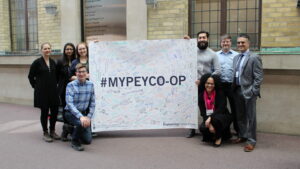WHAT IS IT?
All students complete a full-time work experience, on or off-campus, for a minimum of one term as a component of an academic program (e.g., co-op work term).
IMPORTANT CONSIDERATIONS
Eligibility:
- Students need to be enrolled in a co-op program to participate in a cooperative education experience. Eligibility criteria differs for each program and you may be required to submit an application. Reminder that some co-op programs require admission directly from secondary school.
Duration:
- The duration for these opportunities varies. Work terms typically begin in January, May or September, and involve 4-, 8-, 12-, or 16-month terms of full-time work, although there can be variation with these timelines.
Recognition and / or compensation:
- Students in co-op placements are employees of their placement organization and are paid by the placement organization.
Accessibility:
- Inclusion in EL is achieved when an experience supports learning for all students. In keeping with the Ontario Human Rights Code, the University of Toronto has a commitment to an equitable learning environment for people with disabilities. It is important to engage in an interactive process to determine the optimal and most appropriate accommodations for individual students engaged in experiential learning.
- If a student requires an accommodation related to a professional work term, you may wish to connect with one of the accessibility services offices at the University of Toronto. Staff at these offices will advise you on the disclosure of accommodation requirements as well as support you through the process of determining and negotiating effective accommodations for the student’s individual circumstances.
- Student support offices strive to create a safe and comfortable community where students have opportunities to discuss navigating barriers, find peer support and learn about various academic and social opportunities.
ADDITIONAL INFORMATION
- Students engaging in a co-op work term enter into an employment agreement with the employer organization.
- Review the Guidelines & Procedures page to understand which partnership agreements, insurance and liability coverage and health and safety policies are applicable to co-op work terms. The Experiential Learning Risk Management Matrix provides a one-page overview.
- Students on a professional work term do not have workplace insurance coverage through the University or Ministry of Training, Colleges and Universities. Generally, students have coverage through your employer organization and you should confirm with your employer.
- Students on a professional work term are not covered by the University’s general liability coverage. Generally, students have coverage through your employer organization and you should confirm with your employer.
- Please review the eModules to learn more about intellectual property and non-disclosure agreements arising from co-op work term placements.
OFFICES THAT SUPPORT PROFESSIONAL WORK TERMS / CO-OPS:
U of T Co-op, which includes the following offices:
Faculty of Information’s MI Co-operative Education Option
Munk School of Global Affairs & Public Policy: Master of Global Affairs Program
Munk School of Global Affairs & Public Policy: Master of Public Policy Program
Rotman School of Management’s Flexible Internship Program (FIP)
University of Toronto Mississauga’s Master of Biotechnology
University of Toronto Mississauga’s Master of Management & Professional Accounting
University of Toronto Mississauga’s Master of Management of Innovation
University of Toronto Mississauga’s Master of Science in Sustainability Management
University of Toronto Mississauga’s Master of Urban Innovation
University of Toronto Scarborough’s International Development Co-op
University of Toronto Scarborough’s Master of Environmental Science
BENEFITS
- Students receive supervised guidance over an extended period of time, leading to deeper learning and skill development.
- Co-op placements can be tailored to fit specific disciplinary expectations and benchmarks enhancing students’ understanding of the value and applicability of their degrees.
- Co-ops support the development of students’ professional skills as well as their understanding of professional settings.




